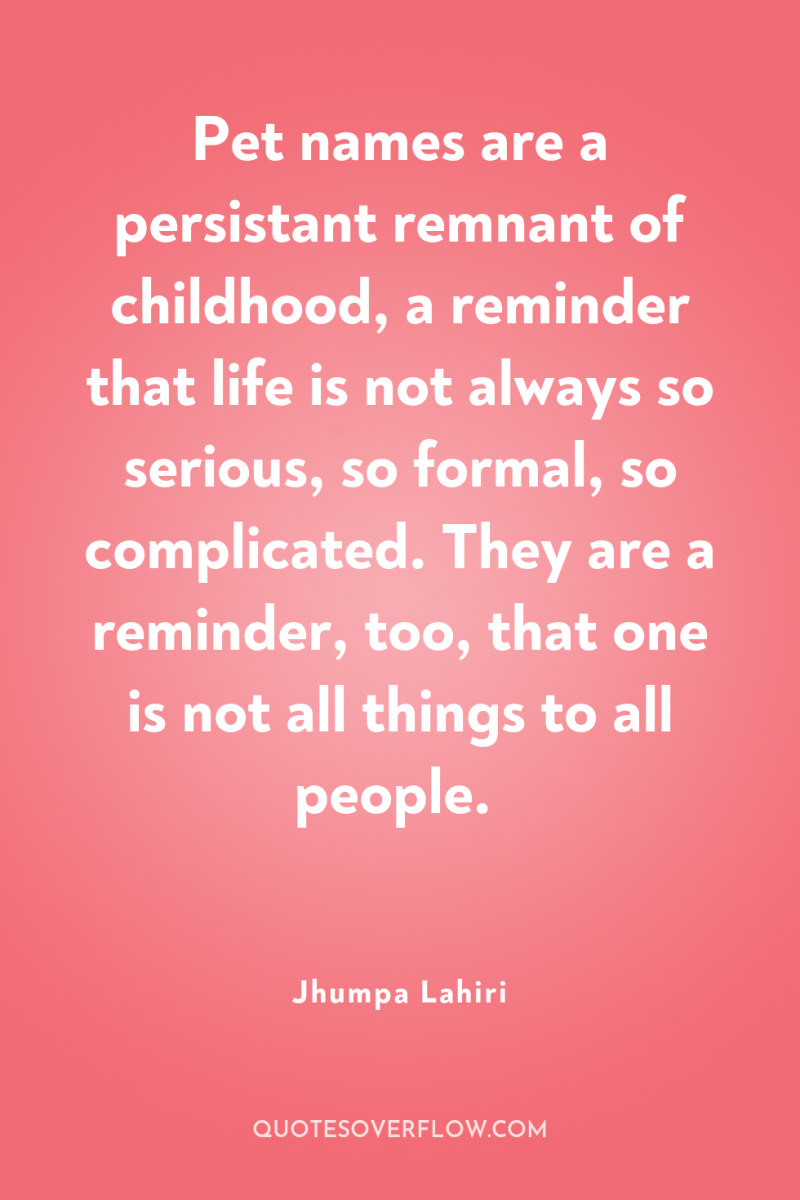
1
Pack a pillow and blanket and see as much of the world as you can. You will not regret it.Jhumpa Lahiri
2
Try to remember it always, " he said once Gogol had reached him, leading him slowly back across the breakwater, to where his mother and Sonia stood waiting. "Remember that you and I made this journey together to a place where there was nowhere left to go.Jhumpa Lahiri

3
Pet names are a persistant remnant of childhood, a reminder that life is not always so serious, so formal, so complicated. They are a reminder, too, that one is not all things to all people.Jhumpa Lahiri
4
There were times Ruma felt closer to her mother in death than she had in life, an intimacy born simply of thinking of her so often, of missing her. But she knew that this was an illusion, a mirage, and that the distance between them was now infinite, unyielding.Jhumpa Lahiri
5
The knowledge of death seemed present in both sisters–it was something about the way they carried themselves, something that had broken too soon and had not mended, marking them in spite of their lightheartedness.Jhumpa Lahiri

6
That's the thing about books. They let you travel without moving your feet.Jhumpa Lahiri

7
My grandfather says that's what books are for, " Ashoke said, using the opportunity to open the volume in his hands. "To travel without moving an inch.Jhumpa Lahiri
8
When you’re in love, you want to live forever. You want the emotion, the excitement you feel to last. Reading in Italian arouses a similar longing in me. I don’t want to die, because my death would mean the end of my discovery of the language. Because every day there will be a new word to learn. Thus true love can represent eternity.Jhumpa Lahiri
9
He felt his presence on earth being denied, even as he stood there. He was forbidden access; the past refused to admit him. It only reminded him that this arbitrary place, where he'd landed and made his life, was not his,Jhumpa Lahiri
10
But even as she was going through with it she knew it was useless, just as it was useless to save a single earring when the other half of the pair was lostJhumpa Lahiri
11
...that in spite of living in a mansion an American is not above wearing a pair of secondhand pants, bought for fifty cents.Jhumpa Lahiri
12
But death, too, had the power to awe, she knew this now-that a human being could be alive for years and years, thinking and breathing and eating, full of a million worries and feelings and thoughts, taking up space in the world, and then, in an instant, become absent, invisible.Jhumpa Lahiri
13
He still had the power to stagger her at timessimply the fact that he was breathing that all his organs were in their proper places that blood flowed quietly and effectively through his small sturdy limbs. He was her flesh and blood her mother had told her in the hospital the day Akash was born.Jhumpa Lahiri
14
I think that a writer should observe the real world before imagining a non-existent one.Jhumpa Lahiri
15
...American book jackets reflect the spirit of country - little homogeneity, lots of diversity.Jhumpa Lahiri
16
Most people trusted in the future, assuming that their preferred version of it would unfold.Jhumpa Lahiri
17
Imperfection inspires invention, imagination, creativity. It stimulates. The more I feel imperfect, the more I feel alive.Jhumpa Lahiri
18
She had generated alternative versions of herself. She had insisted at brutal cost on these conversions. Layering her life, only to strip it bare. Only to be alone in the end. Her life had been paired down to its solitary components.Jhumpa Lahiri
19
A woman who had fallen out of love with her lifeJhumpa Lahiri
20
Those who don't belong to any specific place can't, in fact, return anywhere.Jhumpa Lahiri
21
He owned an expensive camera that required thought before you pressed the shutter, and I quickly became his favorite subject, round-faced, missing teeth, my thick bangs in need of a trim. They are still the pictures of myself I like best, for they convey that confidence of youth I no longer possess, especially in front of a camera.Jhumpa Lahiri
22
Belonging to another man and therefore not even a little bit to him.Jhumpa Lahiri
23
In a world of diminishing mystery, the unknown persists.Jhumpa Lahiri
24
With children the clock is reset. We forget what came beforeJhumpa Lahiri
25
On a sticky August evening two weeks before her due date, Ashima Ganguli stands in the kitchen of a Central Square apartment, combining Rice Krispies and Planters peanuts and chopped red onion in bowl.Jhumpa Lahiri
26
In their silence they continued both to protect me and to punish me. The memory of that night was now the only tie between us, eclipsing everything else.Jhumpa Lahiri
27
But he was no longer in Tollygunge. He had stepped out of it as he had stepped so many mornings out of his dreams, its reality and its particular logic rendered meaningless in the light of day. The difference was so extreme that he could not accommodate the two places together in his mind. In this enormous new country, there seemed to be nowhere for the old to reside. There was nothing to link them; he was the sole link. Here life ceased to obstruct or assault him. Here was a place where humanity was not always pushing, rushing, running as if with a fire at its back.Jhumpa Lahiri
28
Will you remember this day, Gogol?" his father had asked, turning back to look at him, his hands pressed like earmuffs to either side of his head. "How long do I have to remember it?" Over the rise and fall of the wind, he could hear his father's laughter. He was standing there, waiting for Gogol to catch up, putting out a hand as Gogol drew near. "Try to remember it always, " he said once Gogol reached him, leading him slowly back across the breakwater, to where his mother and Sonia stood waiting. "Remember that you and I made this journey, that we went together to a place where there was nowhere left to go.Jhumpa Lahiri
29
I returned to my existence, the existence I had chosen instead of you.Jhumpa Lahiri
30
There was the focus of seeking pleasure, and the numbing effect, once they were finished, removing all specific thoughts from her brain. It ushered in the solid, dreamless sleep that otherwise eluded her.Jhumpa Lahiri
31
I owed the greater apology, but at the same time I knew that was done was done, that no matter what I said now I would never be able to make it right.Jhumpa Lahiri
32
On weekdays, as soon as she picked Bela from the bus stop and brought her home, she went straight into the kitchen, washing up the morning dishes she'd ignored, then getting dinner started. She measured out the nightly cup of rice, letting it soak in a pan on the counter. She peeled onions and potatoes and picked through lentils and prepared another night's dinner, then fed Bela. She was never able to understand why this relatively unchallenging set of chores felt so relentless. When she was finished, she did not understand why they had depleted her .Jhumpa Lahiri
33
She learned that an act intended to express love could have nothing to do with it. That her heart and her body were different things.Jhumpa Lahiri
34
The blood of too many, dissolving the very stain.Jhumpa Lahiri
35
While the astronauts, heroes forever, spent mere hours on the moon, I have remained in this new world for nearly thirty years. I know that my achievement is quite ordinary. I am not the only man to seek his fortune far from home, and certainly I am not the first. Still, there are times I am bewildered by each mile I have traveled, each meal I have eaten, each person I have known, each room in which I have slept. As ordinary as it all appears, there are times when it is beyond my imagination." (from "The Third and Final Continent") .Jhumpa Lahiri
36
Nor was her love for Udayan recognizable or intact. Anger was always mounted to it, zigzagging through her like some helplessly mating pair of insects. Anger at him for dying when he might have lived. For bringing her happiness, and then taking it away. For trusting her, only to betray her. For believing in sacrifice, only to be so selfish in the end.Jhumpa Lahiri
37
No more bells ringing in the middle of the afternoon demolishing the rest of the day. No more waiting for the situation to change.Jhumpa Lahiri
38
She had denied herself the pleasure of openly sharing life with the person she loved.Jhumpa Lahiri
39
It's easier to surrender to confinement.Jhumpa Lahiri
40
I'm bound to fail when I write in Italian, but unlike my sense of failure in the past, this doesn't torment or grieve me.Jhumpa Lahiri
41
I've never had Internet access. Actually, I have looked at things on other people's computers as a bystander. A few times in my life I've opened email accounts, twice actually, but it's something I don't want in my life right now.Jhumpa Lahiri
42
Almost any American can connect on some level to a family background of having come across some ocean. They say, 'My great-grandparents came from wherever... this is why we have this last name, why we do this thing at Christmas.' All the details get watered down but don't quite disappear.Jhumpa Lahiri
43
In graduate school, I decide to write my doctoral thesis on how Italian architecture influenced English playwrights of the seventeenth century. I wonder why certain playwrights decided to set their tragedies, written in English, in Italian palaces.Jhumpa Lahiri
44
I don't know why, but the older I get the more interested I get in my parents' marriage. And it's interesting to be married yourself, too, because there is an inevitable comparison.Jhumpa Lahiri
45
My parents had an arranged marriage, as did so many other people when I was growing up. My father came and had a life in the United States one way and my mother had a different one, and I was very aware of those things. I continue to wonder about it, and I will continue to write about it.Jhumpa Lahiri
46
If you look at my characters as a group, they all have a different relationship with the way that places can signify emotion in them - and the way those bonds can be shattered.Jhumpa Lahiri
47
From the beginnings of literature, poets and writers have based their narratives on crossing borders, on wandering, on exile, on encounters beyond the familiar. The stranger is an archetype in epic poetry, in novels. The tension between alienation and assimilation has always been a basic theme.Jhumpa Lahiri
48
I love reading poetry, and yet, at this point, the thought of writing a poem, to me, is tantamount to figuring out a trigonometry question.Jhumpa Lahiri
49
Language, identity, place, home: these are all of a piece - just different elements of belonging and not-belonging.Jhumpa Lahiri
50
He told me he was working as an interpreter in a doctor's office in Brookline, Massachusetts, where I was living at the time, and he was translating for a doctor who had a number of Russian patients. On my way home, after running into him, I just heard this phrase in my head.Jhumpa Lahiri
51
I think that what I have been truly searching for as a person, as a writer, as a thinker, as a daughter, is freedom. That is my mission. A sense of liberty, the liberty that comes not only from self-awareness but also from letting go of many things. Many things that weigh us down.Jhumpa Lahiri